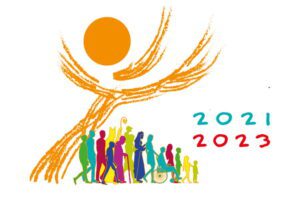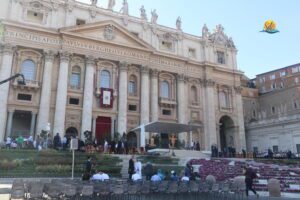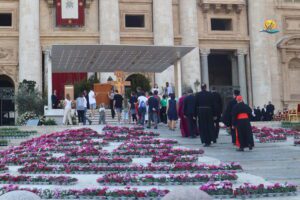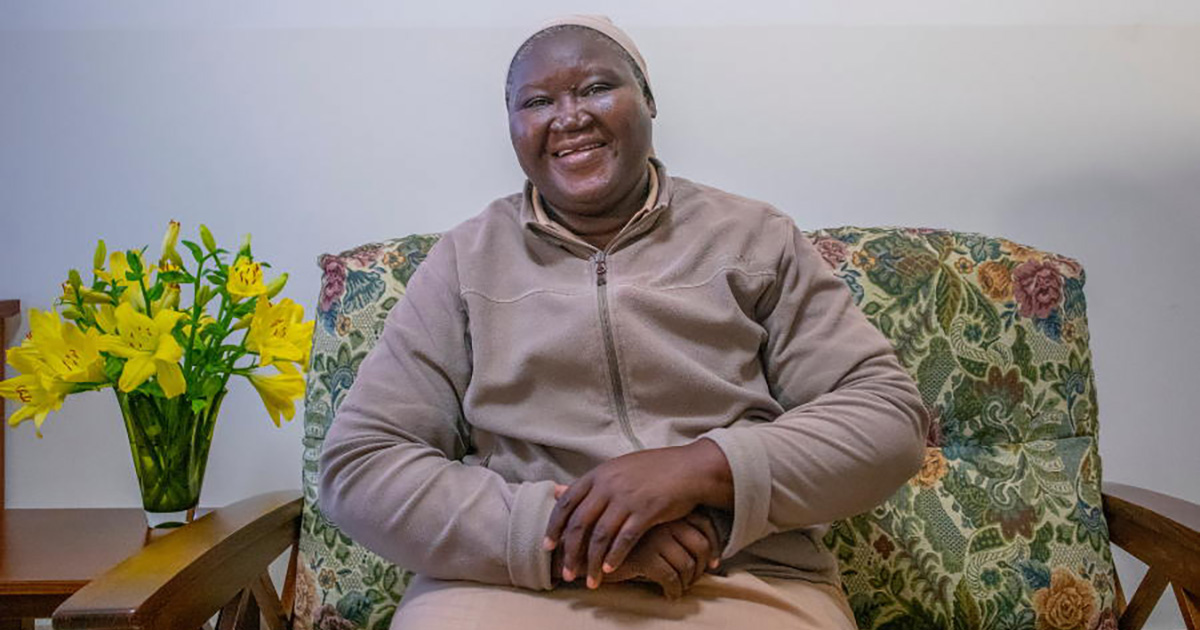She participated in the delicate role of “facilitator.” We had the opportunity to interview her at the end of the Synod work of the First Session of the Synod, October 4-29, 2023.
“My name is sister Paola N., I am a Sister of Charity of St. Jeanne Antida Thouret, I come from the Religious Province of Central Africa and I am originally from Chad“.
Could you tell us about your experience, within the Synod work?
“I can say that the experience of this Synod was really extraordinary for me.
I had to be absent from my parish for a month, but I don’t regret spending this month in Rome, because it was really a very enriching experience, both from the point of view of culture and faith. It was a really interesting experience.”
What was your role as facilitator?
“There were two categories of people at the Synod. There were the members of the Synod and the experts. And among the experts were the theologians and expert facilitators, including me. The presence of the facilitators is justified mainly because it is a new method.
Bishops have always been accustomed to meeting in Synods, and even in the Church we have always been accustomed to meeting, discussing issues, sharing and praying. This time, however, the Pope wanted a new method to be used at the Synod, called conversation in the Spirit, which is completely different from the other exchanges we are used to. For this conversation in the Spirit, the participants in the Synod are called to make themselves available to the Holy Spirit in moments of silence and prayer, and to have a preliminary preparation with an explanation of the texts and the Bible, of a Word that helps them enter into a climate of common discernment.
The role of the facilitator is then to make sure that the participants gradually get into the habit of using this method and to use it to arrive at discernment, to arrive at a common proposal.”
What novelty does this Synod on synodality bring, or could it bring, for a Church that is “closer to people, less bureaucratic and more relational”?
“This particular Synod was wanted because we know that Pope Francis, since he was elected Pope, has always tried to give a new image to the Church.
He said at the beginning of the Synod that we are not here to make a revolution, that we are not here to make important decisions, but actually this Synod was a Synod in which all members, the whole Church, was invited to enter into this way of thinking, in which the Holy Spirit dwells in the heart of every baptized person. And when it comes to important issues that affect the life of the Church, all the baptized are invited to reflect together and discern in order to arrive at common solutions. That is why this Synod is truly the Synod of the people of God, and not only in theory, but in practice.
If you look at the layout of the Synod hall, in the Paul VI hall, we were seated around round tables, and at each table there was a cardinal, a bishop, a girl, a woman, a lay person, a religious person. So there was no hierarchy at this table. There was no protocol. It was simply Christians sitting together to pray, reflect, discuss, and offer their reflections. There was plenty of room for everyone to listen. That’s why the Synod is really a Synod where everyone is put on the same level.”
The poor, protagonists of the Church’s journey. The premise of the Synthesis Document reveals attention to the “cry of the poor, those forced to migrate, those suffering violence or suffering the devastating consequences of climate change.” The Sisters of Charity have always been attentive to the cry of the poor (including migrants, a point also touched upon by the Synod) and the cry of the earth. How can this attention be increased in light of the Synod’s work?
“Before saying what consequences this Synod may have for our way of being with the poor as Sisters of Charity, I wanted to return to the two goals of this Synod.
The Synod helped us to integrate a new method, that of learning to walk together. And the Synod also helped us discover the importance of listening, of listening to the Word of God and listening to others, through this method of conversation in the Holy Spirit.
 We, Sisters of Charity, have always stood by the poor, always lived out our call to follow Christ. This Synod will help us to emphasize the fact that we do not walk for the poor, but rather we walk with the poor with greater sensitivity, listening to them, really trying to be with them and moving forward together with the poor.”
We, Sisters of Charity, have always stood by the poor, always lived out our call to follow Christ. This Synod will help us to emphasize the fact that we do not walk for the poor, but rather we walk with the poor with greater sensitivity, listening to them, really trying to be with them and moving forward together with the poor.”
All disciples, all missionaries. Also within the Synthesis Document we read, “After a month of work, now the Lord is calling us to return to our Churches to transmit to all of you the fruits of our work and to continue the journey together.” The work on synodality has been intertwined with the missionary nature of the Church. How can the newness be brought to parishes and dioceses through the spirit of mission?
“So, yes, the Synod made us feel strongly that we are missionaries together. For those of us who have had this experience at the Synod, what will really be our first message to convey to God’s people is to try to carry it in this method of conversation in the Holy Spirit, which helps people walk together.
We are sent to God’s people so that they realize that the missionary word of the Christian is the fellowship that we live with each other and the fellowship that we live between God and his people.
So the first message we need to convey is this communion that we experienced during the Synod. We rediscovered the beauty of being together. It is beautiful to live together as brothers and sisters. It is beautiful to try to discern together and move forward together. This is the first message we have to convey to God’s people and the first thing we will try to communicate with what we have learned.
Then many themes were addressed, different ones. The Summary Document, in French translation, is about fifty pages. So it means that these different themes will be conveyed. God’s people need to know what we talked about at the Synod, and next year, when we meet again, we will take up these same themes, but with the participation, the contribution of those we met in our different environments. How are the different realities reacting? How have they embraced these themes? How have they received what the Synod has produced as a result of the discernment?”
I guess the experiences of all the people who were around the table also enriched this kind of journey, there were not only their own singularities, but they met with what were different territorialities and experiences. How did you find this within the working tables?
“One of the great riches of this Synod was its diversity, because each table consisted of a dozen people. At each table it was rare to find people from the same country or the same cultural background. We were really heterogeneous, and the first week we spent was dedicated to a kind of giving to others of our experience of church, our experience of synodality or walking together.
It was not only this year that we started hearing about synodality. Since 2021 we have been trying to see what synodality is in light of our lives, our different experiences of church, and so the first week was dedicated to telling our stories. Each of us had to share what we had experienced in terms of synodality in our own church and thus give other members of the group the benefit of our own experience. We listened to each other and it was very, very enriching. That’s why I said at the beginning that this Synod was a spiritual experience, but also a great cultural experience, because we brought a lot to each other.
We are all Christians. We are all baptized, but baptized in our different environments. We have tried to live our Christian life in completely different environments. This has been a great enrichment, because each of us has tried to be Christian in the cultural context, with what society allows us to experience as joy, as difficulty, as constraint, as a challenge to our particularity. And this has enriched us greatly.”
 Women in the life and mission of the Church. We read within the Synthesis Document, “Instead, we wish to promote a Church in which men and women dialogue in order to better understand the depth of God’s plan, in which they appear together as protagonists, without subordination, exclusion, or competition.” How have these innovations been experienced within the works in which you have participated?
Women in the life and mission of the Church. We read within the Synthesis Document, “Instead, we wish to promote a Church in which men and women dialogue in order to better understand the depth of God’s plan, in which they appear together as protagonists, without subordination, exclusion, or competition.” How have these innovations been experienced within the works in which you have participated?
“In general, the theme of the place of women in the Church was lived in a certain atmosphere of serenity, even if there was no lack of tension. Especially we women welcomed this time of sharing in the groups as a new breath that the Church wants to give to women in the Church.
Many women, and also many men in the assembly, in the groups, saw this as an opportunity that the Church is giving to restore women to their place as baptized members of the Christian people. And of course, in the details of the debates or the specific points, there was some tension because it was as if they wanted to reduce this issue to women’s access to ordained ministry, women’s access… But there is much more to it. It’s about giving women back their place in the Church, which is welcomed by everyone.”
Would you like to tell us about a particular experience that you carry in your heart at the end of this experience of the first synodal phase?
“Yes, personally I can say that I experienced the Synod as a parenthesis in the history of the Church, where everything stops. The Church stops to look at itself and see what works well and what needs to improve. So in this parenthesis of the Church in general, I find myself to be a privileged person because, as I said, I come from Africa. I come from an area of Africa where poverty and misery is part of everybody’s daily life; where there are wars that nobody talks about; where there is suffering inflicted on people that nobody talks about. And I come from this unknown corner of the world, from this remote corner of the world, and I’m in this great assembly in the Vatican talking about my experience, talking about the life of my Church, and also seeing how others live as Christians, as consecrated people, as disciples of Jesus Christ. This was really something extraordinary for me, and I consider it a special grace for this year 2023.
Another thing I wanted to say to show the importance of this Synod is that we were Christians of all generations, because there were members of the Synod who were over eighty years old. There were members who were twenty-five years old, so all generations were together.
There were also representatives of the Protestant Churches, and this was a great discovery for me, because I had the impression that ecumenism, that is, this rapprochement between Catholics and Protestants, is experienced differently in our African circles.
 Here, the representatives of the Protestant Churches that I met during the Synod are European, and I feel that for them the rapprochement with the Catholic Church happens more quickly and is easier. It is the contacts and exchanges with all these Protestants that help us discover the importance of communion, the importance of being together, and some Christian values that they live and that perhaps for us Catholics are a bit neglected. For example, they talk about inspiration, the meaning of faith, the fact that every Christian is able to read the Word of God, to understand what the Holy Spirit inspires him or her and to share it with others. For us Catholics, for example, on Sundays it is the priest who gives the homily. We always expect the priest to interpret the Word, to explain the Word of God. Protestants experience this more freely, that is, they give more importance to this understanding of the Christian faith by each baptized person. And this familiarity that we experienced with these separate churches during the Synod was a great discovery for me. I also wanted to talk about the rites.
Here, the representatives of the Protestant Churches that I met during the Synod are European, and I feel that for them the rapprochement with the Catholic Church happens more quickly and is easier. It is the contacts and exchanges with all these Protestants that help us discover the importance of communion, the importance of being together, and some Christian values that they live and that perhaps for us Catholics are a bit neglected. For example, they talk about inspiration, the meaning of faith, the fact that every Christian is able to read the Word of God, to understand what the Holy Spirit inspires him or her and to share it with others. For us Catholics, for example, on Sundays it is the priest who gives the homily. We always expect the priest to interpret the Word, to explain the Word of God. Protestants experience this more freely, that is, they give more importance to this understanding of the Christian faith by each baptized person. And this familiarity that we experienced with these separate churches during the Synod was a great discovery for me. I also wanted to talk about the rites.
There are different rites in the Catholic Church. There is the Latin rite, the Coptic rite, the Maronite rite, the Melkite rite, many of them; so there were also all the representatives of these rites and we also had a Mass celebrated in a non-Latin rite. And that helped us discover the value of symbols, the value of all the rites that we experience during Mass and the richness that others can bring to us. So it was also a great discovery in the sense of ecumenism, in the sense of the different rites that exist in the Church.”
Source: https://www.suoredellacarita.org/








0 Comments